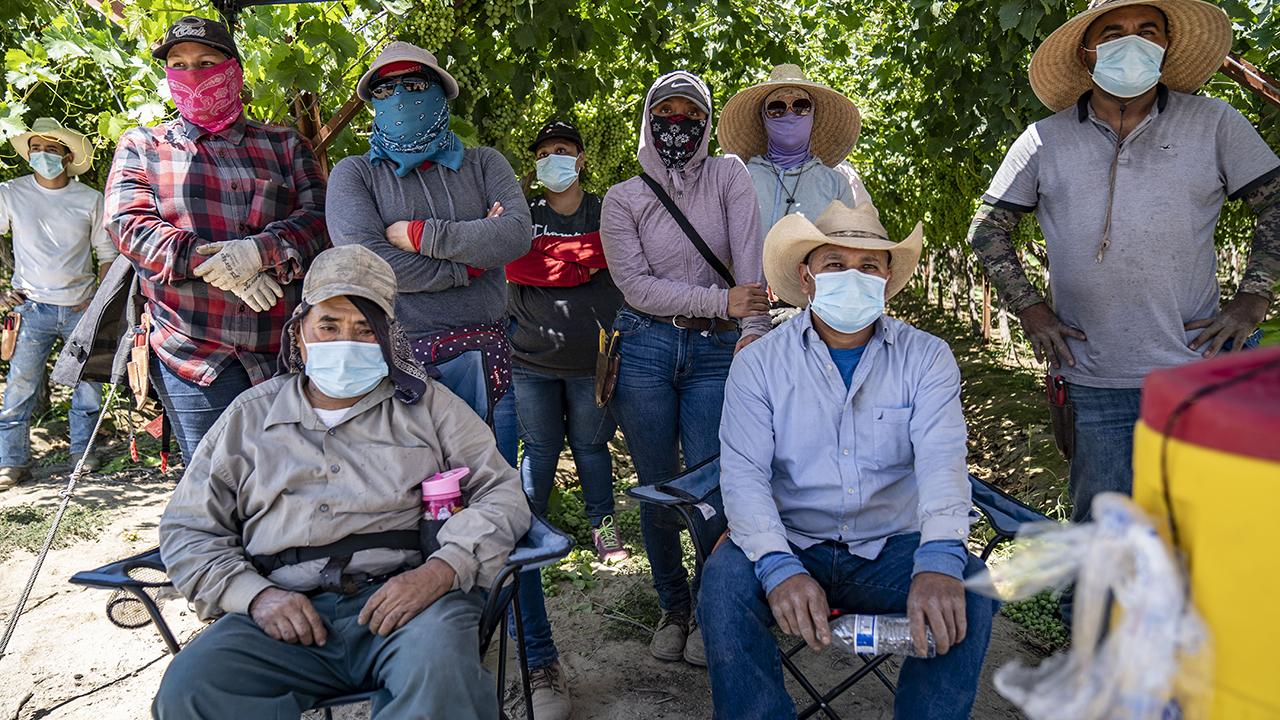
Research Highlight: Five Main Stressors Identified in Farmworkers
This article summarizes the findings of the publication “Occupational Stressors and Access to COVID-19 Resources among Commuting and Residential Hispanic/Latino Farmworkers in a US-Mexico Border Region” by Annie Jane Keeney et al. published in the International Journal of Environmental Research and Public Health in 2022.
COVID-19 has severely impacted the health and livelihoods of many worldwide, with the greatest burdens on “non-health essential workers” such as farmworkers. The health and wellness burdens on the vulnerable farmworker population in the US are already severe, and COVID-19 has deepened inequities. However, few studies have been conducted to determine the specific burdens and stressors to farmworkers resulting from both their occupation and COVID-19.
About the Study
The collaborative research team, from San Diego State University and the Imperial Valley Equity & Justice Coalition, aimed to determine the stressors in commuting and resident farmworkers in the US. This study was led by Dr. Annie Jane Keeney from San Diego State University’s School of Social Work, and this research was funded by a Pilot/Feasibility Grant from the WCAHS.
The COVID-19 mortality rate for Imperial County was more than double that of the next-highest county in California.
This study was conducted in Imperial County, California, which produces more than 100 food commodities, has a large farmworker population, and was extremely hard-hit by COVID-19. Specifically, the COVID-19 mortality rate was more than double that of the next-highest county in California. Imperial County is located near the US–Mexico border, allowing a significant proportion of farmworkers to reside in Mexico and commute daily to the US for work.
The authors conducted survey interviews with 199 Hispanic/Latino farmworkers in Imperial County from June 2021–August 2021. Surveys were conducted in Spanish in-person or via phone call. The in-person surveys primarily took place at transit points for farmworkers along the US–Mexico border and were typically conducted at approximately 3 am and 4 pm, when farmworkers were in transit. Age, gender, residence, birth country, commute time from home, the number of household members, health issues, and COVID-19 vaccination status were collected from each survey respondent. The survey used was a Migrant Farmworker Stress Inventory, which included 39 standard questions that had answers on a five-point scale, ranging from “Have Not Experienced” to “Extremely Stressful.” In addition to the standard 39 questions, the survey included two added questions: “I worry that the air I breathe at work is not clean” and “Sometimes I feel like I don’t get enough sleep.” Responses from all 41 questions were used to determine stressors to farmworkers.
Study Results
Most survey respondents were foreign-born (76%) and resided in the US on workdays (62.2%). Just under two thirds (59%) of respondents identified as male, and 75% of respondents had received the COVID-19 vaccine. There was no significant difference in COVID-19 infections or COVID-19 vaccine access between commuting (70% vaccinated) and residential farmworkers (79% vaccinated). There was a significantly positive association between receiving the COVID-19 vaccine and those that reported having stress related to communicating in English. Authors credit community outreach in Spanish as positively impacting vaccination rates among farmworkers.
Authors credit community outreach in Spanish as positively impacting vaccination rates among farmworkers.
Analysis of the survey responses enabled the authors to group stressors into main categories causing stress to farmworkers. Stressors varied depending on whether a farmworker commuted to the US from Mexico or lived in the US on weekdays. Specifically, those that commuted were most concerned with lack of sleep, while those that resided in the US were primarily concerned with working conditions.
The most common stressors among all farmworkers surveyed, regardless of residence, were:
- Lack of sleep;
- Distance from family members;
- Bad weather;
- Lack of medical care; and
- Long work hours.
Approximately 40% of interviewees reported high stress levels that may pose mental health risks. Farmworkers who were older and/or foreign-born, regardless of residency, were more likely to report elevated levels of stress.
Study Recommendations
Ensuring the health, safety, and wellbeing of farmworkers in the US, regardless of their residence, is imperative. Foreign-born farmworkers in the US especially require intervention due to high levels of trauma and stress. The positive correlation between receiving a COVID-19 vaccine and stress related to communicating in English supports the benefits of language and culturally appropriate outreach to improve public health efforts. Thus, the findings of this study highlight the importance of Spanish-language COVID-19 outreach to farmworkers.
Further, to the degree community outreach built upon established trust and communication in Spanish was the driver behind high vaccination rates, this type of outreach may be a valuable opportunity to provide mental health resources and screen farmworkers for depression, anxiety, or substance abuse.
